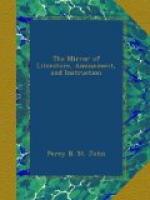This celebrated eminence is situated in the north range of chalk hills, beginning near Farnham, in Surrey, and extending from thence to Folkstone, in Kent. Camden calls it White Hill, from its chalky soil; but Box Hill is its true and ancient name. The box-tree is, in all probability, the natural produce of the soil; but a generally received story is, that the box was planted there by Thomas, Earl of Arundel, between two and three centuries ago. There is, however, authentic evidence of its being here long before his time, for Henry de Buxeto (i.e. Henry of Box Hill) and Adam de Buxeto were witnesses to deeds in the reign of King John.
John Evelyn, who wrote about the middle of the seventeenth century, says, “Box-trees rise naturally at Kent in Bexley; and in Surrey, giving name to Box Hill. He that in winter should behold some of our highest hills in Surrey, clad with whole woods of them, might easily fancy himself transported into some new or enchanted country.”
In Aubrey’s posthumous work on Surrey, published in 1718, the northern part of the hill is described as thickly covered with yew-trees, and the southern part with “thick boscages of box-trees,” which “yielded a convenient privacy for lovers, who frequently meet here, so that it is an English Daphne.” He also tells us that the gentry often resorted here from Ebbesham (Epsom), then in high fashion. Philip Luckombe, in his “England’s Gazetteer,” says, on Box Hill “there is a large warren, but no houses; only arbours cut out in the box-wood on the top of the hill, where are sold refreshments of all sorts, for the ladies and gentlemen who come hither to divert themselves in its labyrinths; for which reason a certain author has thought fit to call it the Palace of Venus, and the Temple of Nature; there being an enchanting prospect from it of a fine country, which is scarce to be equalled for affording so surprising and magnificent an idea both of earth and sky.”
But these delightful retreats, like Arcadia of old, have long since vanished. The yews were cut down in the year 1780; and their successors fall very short of the luxuriant descriptions of old topographers. The box has also at various times produced the proprietors of the estate great profit. In 1608, the receipt for box-trees cut down upon the sheepwalk on the hill was 50_l_.; in an account taken in 1712, it is supposed that as much had been cut down, within a few years before, as amounted to 3,000_l_.; and in 1759, a Mr. Miller lamented that “the trees on Box Hill had been pretty much destroyed; though many remained of considerable bigness.”




